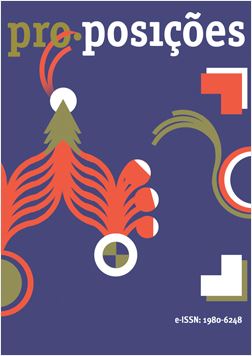Resumo
O artigo de Vigotski sobre a psicologia do ator é um bom exemplo de continuidades e conexões entre a obra inicial e final desse psicólogo e crítico teatral. Contrário à divisão entre uma fase “instrumental”, “mecanicista” e “reducionista” antes de 1930 e uma fase “holítistica” (Yasnitsky, van der Veer, 2016, p. 92), o discurso sobre o ator e a noção diderotiana de “sentimentos artificiais” (sensibilité artificielle) comprova o compromisso permanente de Vigotski quanto a questões da vivência (perejivânie), catarse e o status das emoções. A dicotomia entre as emoções do ator, como mostrado por Diderot e “Paradoxo do comediante”, é a chave para Vigotski insistir na historicidade das emoções e em uma transformação dos métodos da psicologia. Como parte do trabalho criativo, as emoções do ator são divididas em forças opostas. Em Psicologia da arte, o termo formalista para tal divisão é dvoistvennost (duplicidade). Apenas ao superar as suposições naturalistas e colocar as emoções no contexto de outras funções mentais, a psicologia seria capaz, por meio de métodos indiretos, de lidar com essa historicidade. Esta é uma “psicologia em termos do drama”, como sugerido em “Psicologia concreta”. O presente artigo se concentra nas conexões entre as resenhas iniciais, Psicologia da arte (1925), “Psicologia concreta humana” (1929) e “Sobre a questão da psicologia da criação pelo ator” (1932).
Referências
Brodsky, C. (2014). “The Real Horizon” (beyond Emotions): What Proust (Wordsworth, Rousseau, Diderot, and Hegel) Had “in” Mind. Rethinking Emotion: Interiority and Exteriority in Premodern, Modern, and Contemporary Thought Ed. by R. Campe and J. Weber. Berlin: De Gruyter. https://doi.org/10.1515/9783110259254
Dafermos, M. (2021). The metaphysics of psychology and a dialectic perspective. Theory & Psychology, 31(3), 355-374
Diderot, D. (1883). The Paradox of Acting Transl. by W. H. Pollock. With a preface by H. Irving. London: Chatto & Windus.
Gurevich, L. Ya. (1927). Tvorchestvo aktera. O prirode chudozhestvennych perezhivanii aktera na scene Moskva: GAChN.
Hansen-Löve, A. A. (2001): Russkij formalism: Metodologicheskaia rekonstrukciia razvitiia na osnove principa ostraneniia Moskva: Yazyki russkoi kul’tury (first published in German, 1978).
Kloetzer, L. (2020). Concrete Psychology and the Activity Clinic Approach: Implications for Interventionist Research in the XXIst Century. Kulʹturno-Istoricheskaia Psikhologiia, 16(2), 42-50. https://doi.org/10.17759/chp.2020160206
Larrain, A., & Haye, A. (2020). The dialogical and political nature of emotions: A reading of Vygotsky’s The Psychology of Art Theory & Psychology, 30(6), 800-812. https://doi.org/10.1177/0959354320955235
Mareev, S. N. (2017). L. S. Vygotsky. Filosofija, psichologija, iskusstvo Moskva: Akadem. proekt.
Menke, C. (2021): The paradox of capacity and the power of beauty. Critical Theory and New Materialisms Ed. by H. Rosa, C. Henning, A. Bueno. New York: Routledge, 95-106.
Politzer, G. (1994). Critique of the Foundations of Psychology: The Psychology of Psychoanalysis Translated by M. Apprey. Pittburgh: Duquesne University Press.
Shklovsky, V. (2017). Bowstring: On the Dissimilarity of the Similar Translated by S. Avagyan. Champaign, IL: Dalkey Archive.
Sobkin, V. S. (2016). Zametki po povodu teatral’nych recenzii L.S. Vygotskogo. Kul’turno-istoricheskaia psichologiia, 12(4), 26-38. https://doi.org/10.17759/chp.2016120403
van der Veer, R. & Valsiner, J. (1991). Understanding Vygotsky. A Quest for Synthesis Oxford/Cambridge: Blackwell.
Vassilieva, J., & Zavershneva, E. (2020). Vygotsky’s “Height Psychology”: Reenvisioning General Psychology in Dialogue With the Humanities and the Arts. Review of General Psychology, 24(1), 18-30. https://doi.org/10.1177/1089268020902723
Veresov, N. (2017). The Concept of Perezhivanie in Cultural-Historical Theory: Content and Contexts. Perezhivanie, Emotions and Subjectivity Ed. by M. Fleer, F. González Rey, N. Veresov. Singapore: Springer https://doi.org/10.1007/978-981-10-4534-9_3
Vigotski, L. S. (2023). Sobre a questão da psicologia da criação pelo ator. (P.N. Marques, Trad.). Pro-Posições, 34, ed0020210085. http://dx.doi.org/10.1590/1980-6248-2021-0085 (Original work published 1936).
Vygotskij, L. S., Zavershneva, E., & Veer, R. (2018). Vygotsky’s Notebooks: A Selection Singapore: Springer https://doi.org/10.1007/978-981-10-4625-4
Vygotsky, L. S. (2015a). K voprosu o psichologii tvorchestva aktera. Polnoe sobranie sochinenii V 16 t. T. 1. Dramaturgiya i teatr. Sost., red., vstup. st., komm., prim. V. S. Sobkin. Moskva: Lev, 437-445 [Engl. transl. Vygotsky, L. S. (1999). On the problem of the actor’s creative work. In L. S. Vygotsky, The collected works Vol. 6. Scientific Legacy. Springer, 237–244].
Vygotsky, L. S. (2015b). Chorosho shitii frak. Polnoe sobranie sochinenii V 16 t. T. 1. Dramaturgiya i teatr. Sost., red., vstup. st., komm., prim. V. S. Sobkin. Moskva: Lev, 349-350.
Vygotsky, L. S. (2005). Konkretnaia psichologiia cheloveka. Psichologiia razvitiia cheloveka Moskva: Smysl, 1020-1038.
Vygotsky, L. S. (2001). Analiz esteticheskoi reakcii Moskva: Labirint.
Wolfe, C. T. (2016). Materialism and “the soft substance of the brain”: Diderot and plasticity. British Journal for the History of Philosophy, 24(5), 963-982. https://doi.org/10.1080/09608788.2016.1169989
Yasnitsky, A. & van der Veer, R. (2016). Vygotsky the published: who wrote Vygotsky and what Vygotsky actually wrote. Revisionist revolution in Vygotsky studies Edited by Anton Yasnitsky and René van der Veer. London, New York: Routledge, 73-93.
Yaroshevsky, M. G. (2013). L. S. Vygotsky. V poiskach novoi psichologii Izd. 3-e. Moskva: Librokom.
Zavershneva, E. I. (2010). “The Way to Freedom”: On the Publication of Documents from the Family Archive of Lev Vygotsky. Journal of Russian and East European Psychology, 48(1), 61-90. https://doi.org/10.2753/RPO1061-0405480103

Este trabalho está licenciado sob uma licença Creative Commons Attribution-NonCommercial 4.0 International License.
Copyright (c) 2023 Pro-Posições


